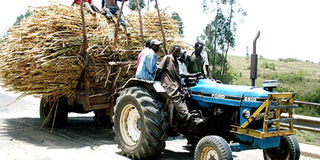Premium
Sugar shortage hits Kenyan market

A tractor delivers sugarcane to a sugar factory in the Nyando sugar belt. Photo/FILE.
Kenya faces the bitter reality of a deficit of sugar despite there being plenty of cane. Vast farms are due for harvest but the millers, are grappling with obsolete equipment that cannot handle the crop. The cane is now drying up as farmers long for the day their abundant produce will translate into cash.
Collapsed
The annual 200,000-tonne sugar shortage usually bridged through imports could be rising as demand soars and production dwindles.
In the Nyando sugarbelt, the Miwani sugar factory collapsed years ago, Muhoroni is under receivership while Chemelil is faced with internal problems that have seen farmers whose cane was harvested as far back as March still waiting for payment.
There have been claims of massive graft in the millers, with farmers claiming that they have had to bribe some managers with up to Sh50,000 for their cane to be harvested.
Parliamentary Committee on Agriculture chairman John Mututho has said the allegations were among several they received from farmers.
“Other than bribing, the farmers claimed that they had to know somebody in a high position so that their cane is harvested in good time,” said Mr Mututho, who is heading a probe into the sugar industry.
Mr Richard Koech, a farmer in the Nandi sugarbelt, said that he had cane that had been on the farm for 45 months and that its sucrose content had considerably reduced.
He said that even when the cane has been harvested, the millers’ low crushing capacity forced transporters to queue for up to four days, further drying the cane and reducing the tonnage, which is the basis of payment.
Mr Ezra Okoth, a Sony sugarbelt farmer, said the delayed harvests and payments had led some to sell their cash crop cheaply to the mushrooming jaggeries in Rongo and Migori districts.
“In some cases, the dried cane has been converted to firewood. Farmers who are not ‘connected’ can wait more than five years before their produce is harvested,” said Mr Okoth, who is also the secretary general of the Kenya Sugarcane Growers Union.
The farmers’ dilemma is compounded by the fact that the cane has taken up all the land they would have used to grow food crops. The failure of the industries to harvest cane on time has led some of them to abandon the growing of the crop altogether.
Nandi farmer Ezekiel Barng’etuny blamed sugar industry woes on the Ministry of Agriculture. According to him, the ministry appointed individuals who had no idea of cane farming to serve as managing directors and board members of sugar factories.
And the chairman of the Chemelil zone of the Kenya Sugarcane Growers Association, Mr Samuel Ong’ou, said that although hunger was a national concern, nothing was being done to address the plight of sugarcane farmers who, though they had the capacity to feed themselves, could not do so because of late payments.
However, Kenya Sugar Board director Nicholas Oricho insisted the problem of overgrown cane rampant in the past had been dealt with by the presence of the privately owned miller, Kibos Sugar Factory.
Kenya has seven major factories with an annual production capacity of between 550,000 and 600,000 tonnes of sugar. By-products from the factories include molasses (mostly for alcohol production), bagasse (for power generation) and filter press mart (for fertiliser).
Already farmers are jittery over the planned lifting of the Comesa safeguards protecting local millers from the importation of sugar from other countries.
The lifting of the safeguards will herald a system where the local sugar will compete with produce from countries which have lowered their costs of production, resulting in cheaper prices.
Experts blame the high cost of production for the lack of competitiveness of Kenyan sugar. It costs as much as Sh41,800 to produce a tonne of sugar compared with Sh24,000 to Sh29,000 in Sudan and Egypt, according to data from the Southern and Eastern Africa Trade Information and Negotiations Institute.




